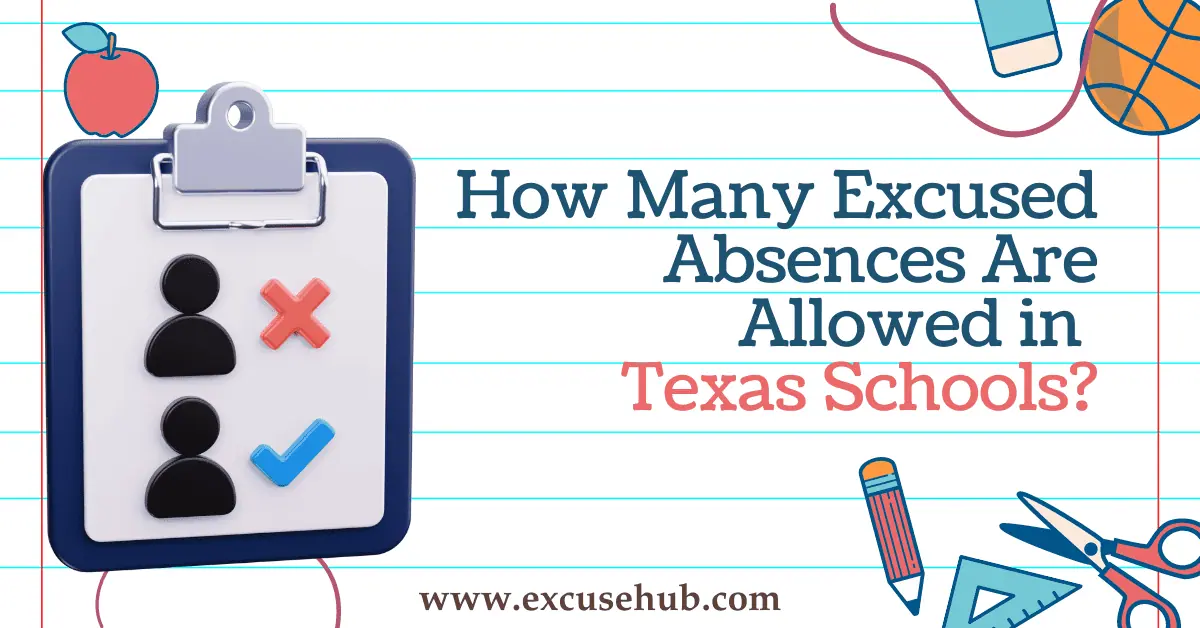How Many Excused Absences Are Allowed in Texas Schools?
In Texas, the number of excused absences you can have varies by school district, usually ranging from five to ten days per semester. Each district defines what counts as an excused absence, commonly including illness, family emergencies, or participation in school activities.
Some may require documentation, such as a doctor’s note, to validate these absences. It’s essential to understand your district’s specific policies, as exceeding the allowed number could impact your grades or even lead to legal issues.
Knowing the details can help you navigate attendance more effectively and keep you informed about your rights and responsibilities.
Key Takeaways
- Texas law allows students to have up to 10 excused absences per semester for illness, family emergencies, and school-related activities.
- Each school district in Texas may have specific policies on the number of excused absences allowed, so it’s important to check local regulations.
- Documentation, such as a doctor’s note, may be required to validate certain excused absences in Texas schools.
- Excessive absences, even if excused, can still impact a student’s grades and eligibility for make-up work.
- Communicating with school officials about absences is crucial to ensure compliance with Texas attendance policies and avoid penalties.
Overview of Attendance Policies
In Texas, attendance policies are crucial for maintaining student engagement and academic performance, outlining the rules regarding excused and unexcused absences as defined by the Texas Education Code (TEC).
These policies establish clear attendance requirements that schools must enforce to ensure students are present for instruction. This includes managing days of school and considering absences related to health care appointments, family emergencies, and mental health.
The enforcement of these policies varies by district, but generally, schools require students to attend a specified number of days each semester.
If a student exceeds the allowed number of absences, it could lead to academic penalties or even retention in the same grade. Such strict adherence underscores the importance of consistent attendance in achieving educational goals.
Additionally, schools often implement interventions for students who struggle with attendance, such as counseling, attendance contracts, and parental involvement.
These measures aim to address underlying issues causing absences and promote a supportive environment that encourages student engagement.
Understanding these attendance policies is vital for both students and parents navigating the academic landscape in Texas. Schools, guided by the Texas Education Agency and the local school district policies, may also have specific rules for students with disabilities or those under an Individualized Education Program (IEP).
Definition of Excused Absences
Excused absences in Texas refer to specific circumstances under which a student’s absence from school is deemed acceptable and doesn’t result in academic penalties. Understanding the definition of excused absences is vital, as it directly impacts students’ academic records and legal standing regarding attendance policies.
Here are some key points to take into account:
- Definition examples: Excused absences typically include illness, family emergencies, or participation in school-related activities.
- Notification requirement: Parents or guardians must inform the school of the absence within a specified timeframe to guarantee it’s recognized as excused.
- Legal implications: Failure to comply with attendance laws can lead to consequences for both students and parents, including potential truancy charges.
- Documentation: In certain cases, schools may require documentation, such as a doctor’s note, to validate the excused absence.
Being aware of these elements helps you navigate the complexities of school attendance policies in Texas. Understanding the definition and examples of excused absences guarantees you can make informed decisions and maintain compliance with legal requirements.
Common Reasons for Absences
Understanding the common reasons for absences can help ensure your child meets school attendance requirements while addressing legitimate needs.
One significant reason for missed school days is health issues. Whether it’s a severe illness, a routine check-up, or an appointment with a health care professional, ensuring your child stays healthy is essential.
In such cases, schools, guided by the Texas Education Code (TEC) and the Texas Education Agency, generally accept these absences as excused. For students diagnosed with a disability or under an Individualized Education Program (IEP), these absences are particularly important to document with absence notes from health care professionals.
Family emergencies also warrant consideration. These situations can range from unforeseen incidents, such as a relative’s hospitalization, to essential family matters that require your child’s presence. Schools recognize that family obligations sometimes take precedence over attendance.
School activities, including sports events and academic competitions, often lead to absences as well. Many educational institutions encourage participation in extracurricular activities, understanding their importance in fostering well-rounded development.
Lastly, mental health has gained increasing recognition as a valid reason for absence. Just like physical health, mental well-being can impact a child’s ability to learn effectively.
Schools are becoming more aware of the significance of mental health and are likely to accommodate absences related to it, ensuring that students are not penalized for prioritizing their mental health.
District-Specific Regulations
School districts in Texas implement specific regulations regarding excused absences, which can vary considerably from one district to another. Understanding these district policies is essential for both students and parents to guarantee compliance with attendance regulations.
Here are some key aspects to reflect on:
- Number of Absences: Each district may set a different limit on the number of excused absences allowed per semester.
- Types of Acceptable Absences: Districts often define what constitutes an excused absence, which may include illness, family emergencies, and school-sponsored events.
- Documentation Requirements: Some districts require specific documentation, such as doctor’s notes, to validate an excused absence.
- Impact on Grades: Different policies may influence how absences affect a student’s grades, with some districts offering make-up work options.
Consequences of Excessive Absences
Excessive absences can lead to significant academic consequences, including failing grades and loss of credit, making it essential for students to stay within their district’s attendance guidelines. When you exceed the allowed number of absences, you put your academic standing at risk. Schools often require a certain number of instructional hours for credit, and missing too many days can hinder your ability to meet those requirements.
Moreover, there are legal implications tied to excessive absences. In Texas, the state mandates compulsory attendance laws, and if you accumulate too many unexcused absences, your parents or guardians may face legal action. This can result in fines or even court appearances, which can strain relationships and create additional stress for your family.
It’s important to communicate with your school regarding any legitimate reasons for absences and to provide documentation when necessary. Understanding your district’s policies can help you avoid these pitfalls.
Staying informed and proactive about your attendance not only supports your academic success but also protects you and your family from potential legal complications. Prioritizing attendance is crucial for your education and future opportunities.
Conclusion
Understanding Texas’s attendance policies can help you navigate excused absences effectively.
While regulations may vary by district, knowing the common reasons for absences and their limits can prevent unnecessary complications.
Coincidentally, as you become familiar with these guidelines, you might also discover that maintaining open communication with your school can foster a supportive environment.
Ultimately, staying informed about the rules not only protects your academic standing but also enhances your overall educational experience.
Frequently Asked Questions
Can Parents Report an Absence for Any Reason?
Did you know nearly 10% of students miss school each year? Parents can report absences for valid reasons, fulfilling their responsibilities. However, schools often require documentation to guarantee proper absence reporting and maintain attendance accuracy.
How Do I Provide Documentation for an Excused Absence?
To provide excused absence documentation, gather relevant paperwork, like a doctor’s note or a parent’s letter. Make sure it aligns with acceptable absence reasons, then submit it to your school’s administration promptly for approval.
Are There Different Rules for High School Versus Elementary Attendance?
You’ll find high school attendance rules can feel like a labyrinth, while elementary attendance might seem a breeze. Each level has unique guidelines, emphasizing the importance of understanding your school’s specific policies and requirements.
What Happens if My Child Exceeds the Allowed Absences?
If your child exceeds the allowed absences, they may face attendance consequences, including truancy penalties. Schools can initiate interventions, notify authorities, and potentially impact your child’s academic standing or progress toward graduation.
Can Excused Absences Affect My Child’s Grade or Academic Standing?
Imagine a clock ticking down the school year; each excused absence can impact your child’s grades. Attendance policies often link participation to academic consequences, meaning too many absences—even excused—might still affect their academic standing.








One Comment